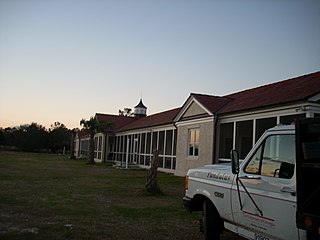Gullah, also called Gullah-English, Sea Island Creole English and Geechee, is a creole language spoken by the Gullah people, an African-American population living in coastal regions of South Carolina and Georgia as well as extreme northeastern Florida and the extreme southeast of North Carolina. Closely related varieties are spoken in the Bahamas and are called Bahamian Creole.

Pin Point is an unincorporated community in Chatham County, Georgia, United States; it is located 11 miles (18 km) southeast of Savannah. Pin Point is part of the Savannah Metropolitan Statistical Area.
The Gullah are African Americans who live in the Lowcountry region of the U.S. states of Georgia, Florida, and South Carolina, in both the coastal plain and the Sea Islands. They developed a creole language, the Gullah language, and a culture rich in African influences that makes them distinctive among African Americans.

Sapelo Island is a state-protected barrier island located in McIntosh County, Georgia. The island is accessible only by aircraft or boat; the primary ferry comes from the Sapelo Island Visitors Center in McIntosh County, Georgia, a seven-mile (11 km), twenty-minute trip. It is the site of Hog Hammock, the last known Gullah community. It is illegal to visit the island without a permit issued by state tourism authorities.

Marquetta L. Goodwine, who was elected Queen Quet, Chieftess of the Gullah/Geechee Nation, is a native of St. Helena Island, South Carolina. She is an author, preservationist, and performance artist. The Gullah/Geechee corridor begins in North Carolina and extends southward to Jacksonville, Florida, encompassing the Sea Islands and the Lowcountry.
Emory Campbell is a community leader among the Gullah people, African Americans who live in the coastal low country region of South Carolina and Georgia. The Gullahs have preserved more of their African linguistic and cultural heritage than any other black community in the US.
Vertamae Smart-Grosvenor was an American culinary anthropologist, griot, food writer, and broadcaster on public media. Born into a Gullah family in the Low Country of South Carolina, she moved with them as a child to Philadelphia during the Great Migration. Later she lived in Paris before settling in New York City. She was active in the Black Arts Movement and performed on Broadway.

Joseph A. Opala, OR is an American historian noted for establishing the "Gullah Connection," the historical links between the indigenous people of the West African nation of Sierra Leone and the Gullah people of the Low Country region of South Carolina and Georgia in the United States.
Sierra Leonean Americans are Americans who are descended from Sierra Leoneans. The population of Sierra Leonean Americans is relatively large and consists, according to surveys of 2013, of 21,538 people. are descended also from Sierra Leonean slaves who were exported to the United States since the 18th until the early 19th century, so the number of people with that heritage should be much higher. So, the number of slaves from present Sierra Leone exported to present United States exceeded the 25.000 people. A peculiar group of people of partially Sierra Leonean descent in United States is that of the Gullah, who, descendants of slaves, fled their owners at the end of the 18th and early 19th century and they established in parts of South Carolina, Georgia, and the Sea Islands, areas in which, even today, they retain their cultures. Moreover, according to the American Community Survey, there are 34,161 Sierra Leonean immigrants living in United States.

The Gullah-Geechee Cultural Heritage Corridor is a federal National Heritage Area in the United States, representing the significant story of the Gullah-Geechee people for maintaining their cultural traditions, and for being a reflection of the values of ingenuity, pride, and perseverance. The intent of the designation is to help us to preserve and interpret the traditional cultural practices, sites, and resources associated with Gullah-Geechee people. Gullah-Geechee Cultural Heritage Corridor, and the federal Gullah-Geechee Cultural Heritage Corridor Commission established to oversee it, were designated by an act of Congress on October 12, 2006 through the National Heritage Areas Act of 2006.

Sassafrass, Cypress & Indigo is a 1982 novel written by Ntozake Shange and first published by St. Martin's Press. The novel, which took eight years to complete, is a story of three Black sisters, whose names give the book its title, and their mother. The family is based in Charleston, South Carolina, and their trade is to spin, weave, and dye cloth; unsurprisingly, this tactile creativity informs the lives of the main characters as well as the style of the writing. Sassafrass, Cypress & Indigo integrates the whole of an earlier work by Shange called simply Sassafrass, published in 1977 by Shameless Hussy Press. As is common in Shange's work, the narrative is peppered with interludes that come in the form of letters, recipes, dream stories and journal entires, which provide a more intimate approach to each woman's journey toward self-realization and fulfillment. The book deals with several major themes, including Gullah/Geechee culture, women in the arts, the Black Arts Movement, and spirituality, among many others.

Vibration Cooking: Or, the Travel Notes of a Geechee Girl is the 1970 debut book by Vertamae Smart-Grosvenor and combines recipes with storytelling. It was published by Doubleday. A second edition was published in 1986, and a third edition was published in 1992. The University of Georgia published another edition in 2011. Smart-Grosvenor went on to publish more cookbooks after Vibration Cooking. Vibration Cooking raised awareness about Gullah culture. Scholar Anne E. Goldman compared Vibration Cooking with Jessica Harris' Iron Pots and Wooden Spoons, arguing that, in both books, "the model of the self... is historicized by being developed in the context of colonialism." Scholar Lewis V. Baldwin recommended Vibration Cooking for its "interesting and brilliant insights on the social significance of food and eating and their relationship to 'place' in a southern context." The book inspired filmmaker Julie Dash to make the film Daughters of the Dust, which won awards at the Sundance Film Festival.

Gullah Gullah Island is an American musical children's television series that was produced by and aired on the Nick Jr. programming block on the Nickelodeon network from 1994 to 1998. The show starred Ron and Natalie Daise, who also served as the cultural advisors, and was inspired by the Gullah culture of Ron Daise's home of St. Helena Island, South Carolina, part of the Sea Islands.

Hog Hammock is an African-American community on Sapelo Island, a barrier island of the U.S. state of Georgia.
Cornelia Walker Bailey was a storyteller, writer, and historian who worked to preserve the Geechee-Gullah culture of Sapelo Island, Georgia.
Geechie is a word referring to the U.S. Lowcountry ethnocultural group of the descendants of West African slaves who retained their cultural and linguistic history, otherwise known as the Gullah people and Gullah language. It has been used as a nickname for persons originating out of this culture and ethnic group. The term derives from the name of the Ogeechee River, an area where many of them settled.
The Gullah are African Americans who live in the Lowcountry region of the U.S. states of Georgia, Florida, and South Carolina.
Edda L. Fields-Black is an African-American historian who is currently Associate Professor of History at Carnegie Mellon University. She is known for her research on West African rice agriculture and societies and the African diaspora.








